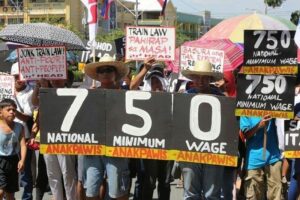A LEGISLATED wage increase could delay interest rate cuts by the central bank and even force it to raise rates if it results in a price spiral, economists said.
“A legislated wage increase would be very damaging to the economy,” Calixto V. Chikiamco, Foundation for Economic Freedom president, said in a Viber message at the weekend. “It will… force the Bangko Sentral ng Pilipinas (BSP) to hike interest rates, further slowing down the economy.”
The proposed wage hike could cause price growth to accelerate. “It might compel the BSP not to cut rates when inflation spikes up again,” John Paolo R. Rivera, president and chief economist at Oikonomia Advisory & Research, Inc., told BusinessWorld via Viber.
This would result in slowing economic growth as consumers “will reduce spending” and companies “will not borrow much to finance productive activities.”
Mr. Rivera also said that the inflation resulting from the proposed legislated across-the-board wage hike may offset any benefits of putting more money in workers’ pockets. “This (wage hike) may lead to a wage spiral, driving faster inflation which would offset the increases in wages.”
Both chambers of Congress started deliberating bills last month that would impose across-the-board minimum wage increases for private-sector workers.
The Senate approved its version seeking a P100 wage increase on final reading in February. Conversely, House bills seeking to increase daily wages from P150 to P750 remain pending at committee level.
Wage hikes often lead to an inflation uptick due to a wage-price spiral. “That’s the normal course of things when wages are increased,” Mr. Rivera said, referring to how wage hikes trigger price increases on goods from increased demand.
However, Federation of Free Workers President Jose G. Matula said the proposed legislated wage hike will help the economy, especially those involved in the informal sector. “Increasing wages would boost the purchasing power of workers, who are also consumers,” he told BusinessWorld via Viber.
“This boost in purchasing power will benefit not only large corporations but also small-scale businesses, as workers would have more disposable income to spend on goods and services,” Secretary General Josua T. Mata of labor group SENTRO told BusinessWorld via Viber.
Commenting on inflationary concerns, think-tank IBON Foundation Executive Director Sonny Jose Enrique A. Africa said that the wage increase would not be inflationary if companies do not pass on the additional wage expenses to consumers.
“The wage hikes on the table will not be inflationary if they are taken from employers’ profits instead of being passed on to consumers,” he said.
Aside from inflationary concerns, the proposed wage hikes could lead to small businesses cutting jobs to ensure survival due to the increased wage bill. “It will cause MSMEs (micro, small and medium enterprises), who account for 90% of employment, to cut jobs,” Mr. Chikiamco said.
“(A) wage hike is good for workers but might be detrimental for business,” Mr. Rivera said, warning of possible disruptions in business operations should the proposed wage increases be approved.
Approving a legislated wage increase would also “scare off” both “foreign and local investors” from investing in the country, Mr. Chikiamco said.
“Contrary to fears propagated by some, a wage increase would not be detrimental to businesses,” Mr. Mata said, referring to concerns by businesses on the proposed wage hikes. “Historical evidence indicates no widespread closures resulting from such increases.”
Mr. Africa said that employee compensation for MSMEs and large businesses only accounts for 10.9% of total expenses, on average. “The wage hikes on the table now are affordable.”
“The government should be… the first to think that higher wages are a key measure for making economic growth more inclusive,” Mr. Africa added. — Kenneth Christiane L. Basilio
